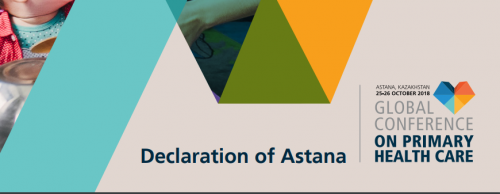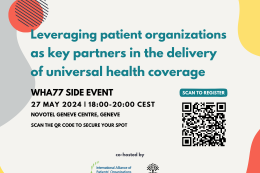The expert patient is a resource that primary health care must utilise

In 1974 the leaders of the 17 non-aligned nations had lobbied the United Nations Conference on Trade and Development and had put into place the policy instrument: the Declaration for the Establishment of a New International Economic Order. This was the harbinger of the reform to come that would change General Agreement on Tariffs and Trade (GATT) later. These nations had been pushing to secure better terms of trade for their commodities. In 1978 there was a new spirit of internationalism as the journey towards globalism had just started. There was a thaw in the cold-war as President Jimmy Carter had come into the White House and had developed a rapport with the Soviet leader Leonid Brezhnev. The global power had begun to shift as the Organization of the Petroleum Exporting Countries (OPEC) had just proved that they could almost bring northern Europe and the World to a stop by managing oil prices. In 1977 WHO and its 194 member states had eradicated smallpox principally through vaccination led by primary health care teams. There was a new optimism about global cooperation and improving health outcomes for all.
The first Declaration of Alma-Ata 1978, adopted by all WHO Member States in Alma-Ata (now Almaty) in the Soviet Kazakh Republic (now Republic of Kazakhstan), was an important declaration made during this optimistic times. It was made at the first global gathering of health experts and world leaders and the first to emphasise the role of primary health care and commit to ‘health for all’. In light of this internationalism, the WHO, UNICEF, international organizations, multilateral and bilateral agencies, non-governmental organizations, funding agencies, health workers and ministries of health joined up to promote, protect and support national and international commitment to primary health care. Alma-Ata Declaration set the commitment to increase technical and financial support to low and middle income countries.
The conference called on ALL to collaborate and support primary health care in accordance with the spirit and content of the declaration. It set out10 points to follow and started by defining health in line with the WHO constitution: Health is "a state of complete physical, mental and social well-being and not merely the absence of disease or infirmity" and then moved to include social and economic sectors within the scope of attaining health and reaffirms health as a human right.
Astana 2018The Declaration of Astana on Primary Health Care adopted forty years later on 25th October 2018 in Astana Kazakhstan brings a new world order. The Soviet Union is gone, Alma-Ata has changed its name to Almaty and despite USA President’s, Donald Trump's earlier proclamation at the UNGA 2018 that patriotism overruled globalism, Astana 2018 has managed to bring new global stakeholders into this declaration.
For the first time, we now have civil society, patient groups, international development agencies, other supra NGOs like Gates Foundation and GAVI joining health experts and world leaders in championing for primary healthcare. This conference, attended by over 2000 participants from 150 countries around the globe showed the rise of civil society participation and engagement in health care policy and service delivery. The presence of patient organisations and the willingness of the organisers to give them a platform on all discussion panels indicated that the world of primary health care had moved on since 1978.
Why a primary health care focus?- Governments and societies that prioritize, promote and protect people’s health and well-being, at both population and individual levels, through strong health systems;
- Primary health care and health services that are high quality, safe, comprehensive, integrated, accessible, available and affordable for everyone and everywhere, provided with compassion, respect and dignity by health professionals who are well-trained, skilled, motivated and committed;
- Enabling and health-conducive environments in which individuals and communities are empowered and engaged in maintaining and enhancing their health and well-being;
- Partners and stakeholders aligned in providing effective support to national health policies, strategies and plans
IAPO's Position: Why is primary health care important for patients?
- Primary prevention (stops us from becoming patients in the first place!).
- Secondary prevention. Most importantly PHC must have robust secondary prevention programmes that prevent our diseases progressing out of control, requiring acute care and hospitalisation. The monthly monitoring of diabetic patients to prevent retinopathy, nerve damage and kidney dialysis clinics are examples of secondary prevention.
- Providing patients with psychosocial support. Someone to talk to and share your experiences, especially if patients and community groups are allowed to be set-up and use the clinic days to meet up.
- Participation of expert patients. Expert patients to participate in and contribute towards their local preventative, curative, rehabilitative and other primary care programmes.
- Patient engagement in PHC.
- Patient groups, especially expert patients, are an important health asset and investment for PHC. States must invest in developing our capacity to participate and engage with PHC decision-making. It is urgent that our participation be reviewed if we want a patient centric PHC (Leveraging up specific community health assets to improved integration to develop national community health platforms and strong community health systems).
- We need to break the professional and systems silos that currently exist in PHC and ensure that patients are integrated within every structure of the PHC system and decision making (PHC: breaking the silos to make it happen).
- From early screening and diagnosis, right through to secondary prevention programmes, there should be an integrated and well publicised care-path way. The expert patients can illuminate this pathway for new patients. Expert patients act as path finders (we are an asset to PHC) Integrating Primary Health Care Service Delivery.
- When Educating and scaling up Primary Health Care workforce to achieve UHC , remember patient advocates (expert patients) are your greatest asset. You must educate and develop them too. They are value for money. Local and loyal.
- The threat of over diagnosis, especially in anti-biotic prescription, is a shared responsibility between the patients and their health professionals in PHC. As UK Chief Medical Officer said: pushy patients and push over health professionals are a risk to the antimicrobial resistance control.
- Valuable resource in health promotion and prevention programmes,
- Link to the local community and patient community,
- Advocate at local administrative and political gatherings, and
- ‘Media savvy’ spokesperson for the PHC.
Proposed Modified WHO Building Blocks of Primary Health Care (PHC) post Astana. Red shows where patients can help.




